Analysis of Corporate Social Responsibility and Ethical Practices
VerifiedAdded on 2022/08/25
|6
|1670
|20
Report
AI Summary
This report provides a comprehensive analysis of Corporate Social Responsibility (CSR) and ethical practices within the context of the modern business environment. It emphasizes the crucial role of CSR in enhancing company policies, reputation, and achieving sustainability. The report discusses how businesses are increasingly focusing on social responsibilities, ranging from environmental protection to addressing global issues, to meet societal, industry, and customer expectations. It defines CSR as practices aimed at achieving sustainability by addressing social and environmental outcomes, including community engagement, human rights, and labor laws. The report highlights the importance of ethical practices, which ensure justice, morality, and freedom for all stakeholders, and it examines how these practices contribute to long-term business success. It concludes that businesses can maximize success by adopting CSR policies and ethical considerations, contributing to social and environmental causes, fostering a positive working environment for employees, and ultimately achieving brand recognition and sustained growth.

Running head: MANAGEMENT
Management
Name of the Student:
Name of University:
Author Note
Management
Name of the Student:
Name of University:
Author Note
Paraphrase This Document
Need a fresh take? Get an instant paraphrase of this document with our AI Paraphraser
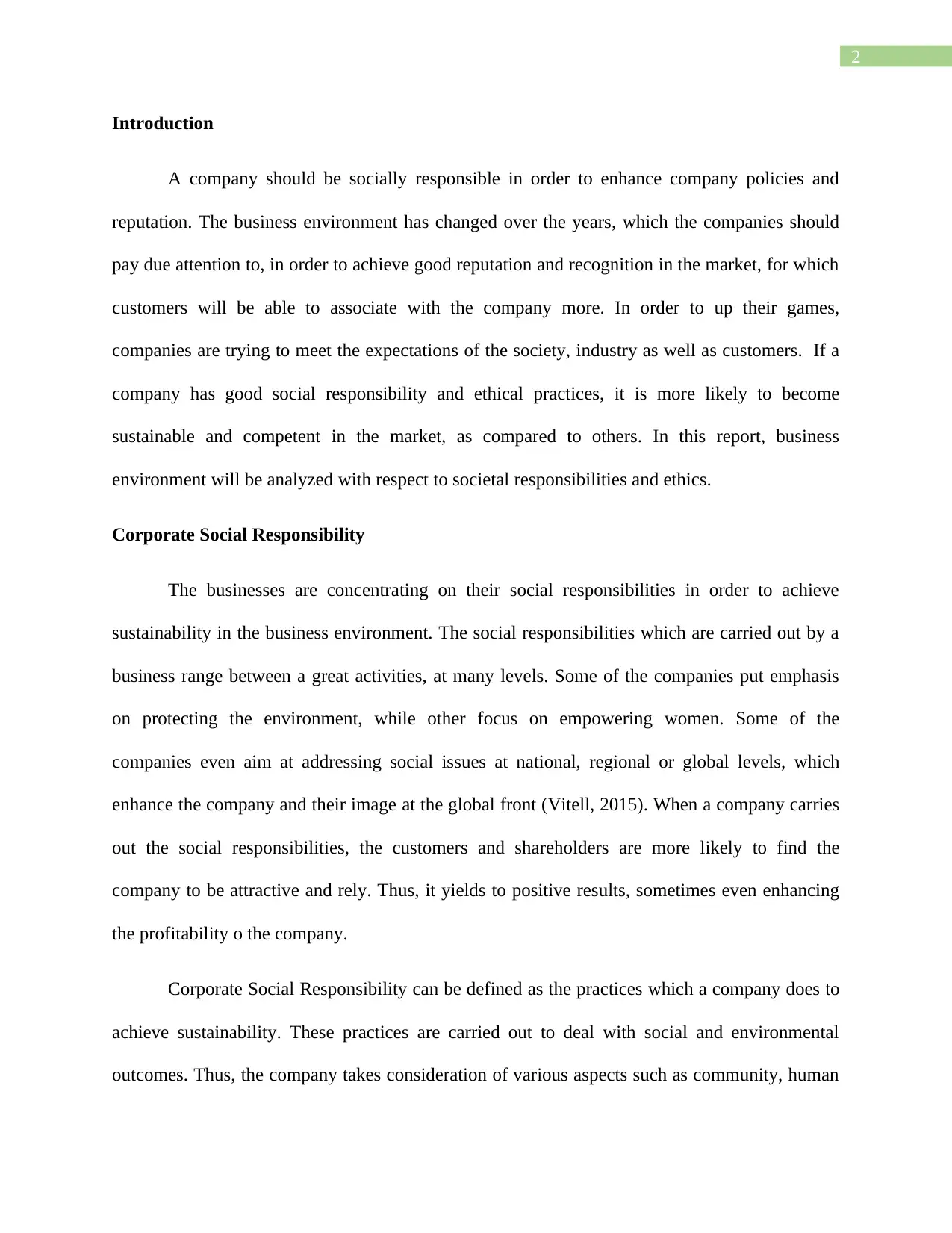
2
Introduction
A company should be socially responsible in order to enhance company policies and
reputation. The business environment has changed over the years, which the companies should
pay due attention to, in order to achieve good reputation and recognition in the market, for which
customers will be able to associate with the company more. In order to up their games,
companies are trying to meet the expectations of the society, industry as well as customers. If a
company has good social responsibility and ethical practices, it is more likely to become
sustainable and competent in the market, as compared to others. In this report, business
environment will be analyzed with respect to societal responsibilities and ethics.
Corporate Social Responsibility
The businesses are concentrating on their social responsibilities in order to achieve
sustainability in the business environment. The social responsibilities which are carried out by a
business range between a great activities, at many levels. Some of the companies put emphasis
on protecting the environment, while other focus on empowering women. Some of the
companies even aim at addressing social issues at national, regional or global levels, which
enhance the company and their image at the global front (Vitell, 2015). When a company carries
out the social responsibilities, the customers and shareholders are more likely to find the
company to be attractive and rely. Thus, it yields to positive results, sometimes even enhancing
the profitability o the company.
Corporate Social Responsibility can be defined as the practices which a company does to
achieve sustainability. These practices are carried out to deal with social and environmental
outcomes. Thus, the company takes consideration of various aspects such as community, human
Introduction
A company should be socially responsible in order to enhance company policies and
reputation. The business environment has changed over the years, which the companies should
pay due attention to, in order to achieve good reputation and recognition in the market, for which
customers will be able to associate with the company more. In order to up their games,
companies are trying to meet the expectations of the society, industry as well as customers. If a
company has good social responsibility and ethical practices, it is more likely to become
sustainable and competent in the market, as compared to others. In this report, business
environment will be analyzed with respect to societal responsibilities and ethics.
Corporate Social Responsibility
The businesses are concentrating on their social responsibilities in order to achieve
sustainability in the business environment. The social responsibilities which are carried out by a
business range between a great activities, at many levels. Some of the companies put emphasis
on protecting the environment, while other focus on empowering women. Some of the
companies even aim at addressing social issues at national, regional or global levels, which
enhance the company and their image at the global front (Vitell, 2015). When a company carries
out the social responsibilities, the customers and shareholders are more likely to find the
company to be attractive and rely. Thus, it yields to positive results, sometimes even enhancing
the profitability o the company.
Corporate Social Responsibility can be defined as the practices which a company does to
achieve sustainability. These practices are carried out to deal with social and environmental
outcomes. Thus, the company takes consideration of various aspects such as community, human
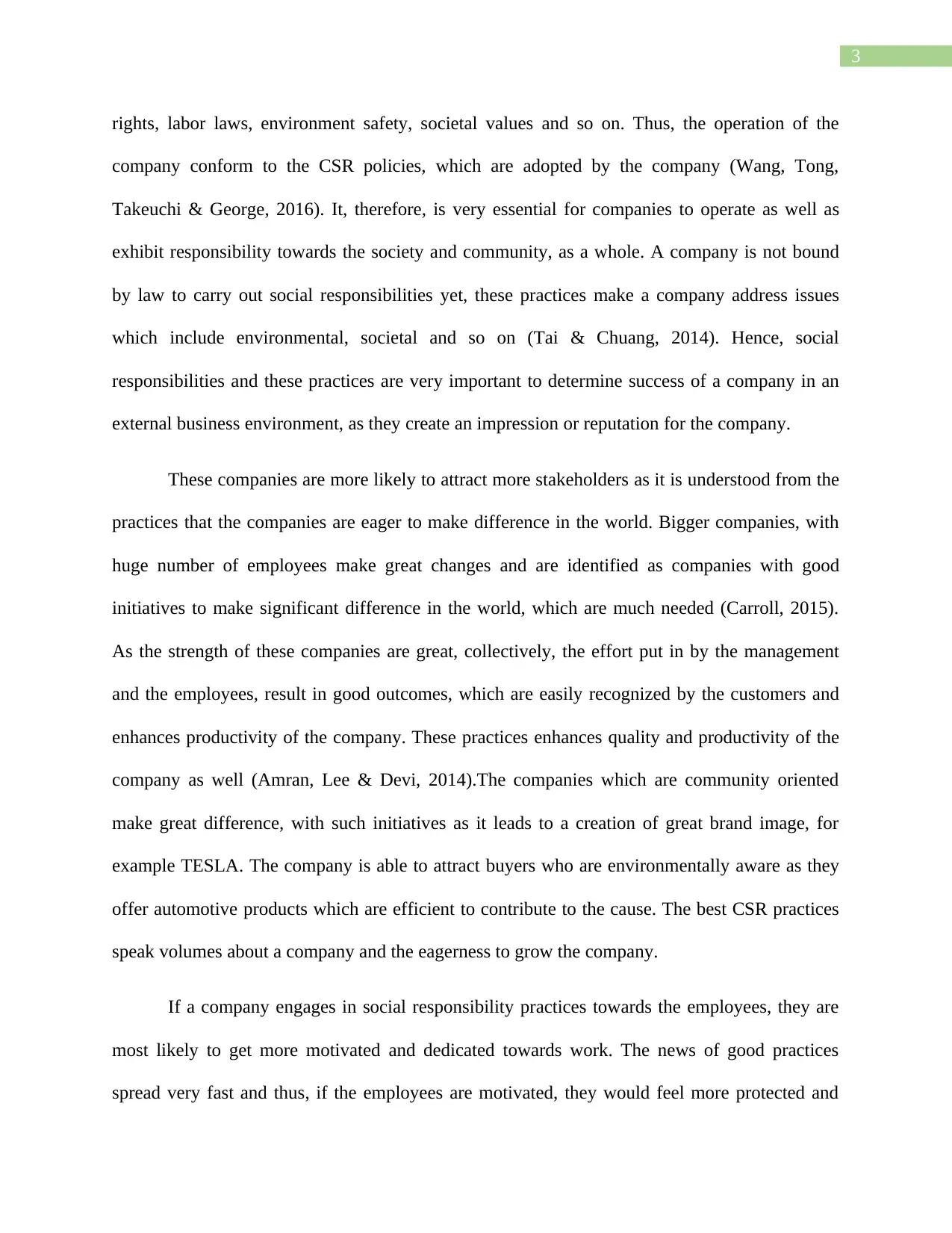
3
rights, labor laws, environment safety, societal values and so on. Thus, the operation of the
company conform to the CSR policies, which are adopted by the company (Wang, Tong,
Takeuchi & George, 2016). It, therefore, is very essential for companies to operate as well as
exhibit responsibility towards the society and community, as a whole. A company is not bound
by law to carry out social responsibilities yet, these practices make a company address issues
which include environmental, societal and so on (Tai & Chuang, 2014). Hence, social
responsibilities and these practices are very important to determine success of a company in an
external business environment, as they create an impression or reputation for the company.
These companies are more likely to attract more stakeholders as it is understood from the
practices that the companies are eager to make difference in the world. Bigger companies, with
huge number of employees make great changes and are identified as companies with good
initiatives to make significant difference in the world, which are much needed (Carroll, 2015).
As the strength of these companies are great, collectively, the effort put in by the management
and the employees, result in good outcomes, which are easily recognized by the customers and
enhances productivity of the company. These practices enhances quality and productivity of the
company as well (Amran, Lee & Devi, 2014).The companies which are community oriented
make great difference, with such initiatives as it leads to a creation of great brand image, for
example TESLA. The company is able to attract buyers who are environmentally aware as they
offer automotive products which are efficient to contribute to the cause. The best CSR practices
speak volumes about a company and the eagerness to grow the company.
If a company engages in social responsibility practices towards the employees, they are
most likely to get more motivated and dedicated towards work. The news of good practices
spread very fast and thus, if the employees are motivated, they would feel more protected and
rights, labor laws, environment safety, societal values and so on. Thus, the operation of the
company conform to the CSR policies, which are adopted by the company (Wang, Tong,
Takeuchi & George, 2016). It, therefore, is very essential for companies to operate as well as
exhibit responsibility towards the society and community, as a whole. A company is not bound
by law to carry out social responsibilities yet, these practices make a company address issues
which include environmental, societal and so on (Tai & Chuang, 2014). Hence, social
responsibilities and these practices are very important to determine success of a company in an
external business environment, as they create an impression or reputation for the company.
These companies are more likely to attract more stakeholders as it is understood from the
practices that the companies are eager to make difference in the world. Bigger companies, with
huge number of employees make great changes and are identified as companies with good
initiatives to make significant difference in the world, which are much needed (Carroll, 2015).
As the strength of these companies are great, collectively, the effort put in by the management
and the employees, result in good outcomes, which are easily recognized by the customers and
enhances productivity of the company. These practices enhances quality and productivity of the
company as well (Amran, Lee & Devi, 2014).The companies which are community oriented
make great difference, with such initiatives as it leads to a creation of great brand image, for
example TESLA. The company is able to attract buyers who are environmentally aware as they
offer automotive products which are efficient to contribute to the cause. The best CSR practices
speak volumes about a company and the eagerness to grow the company.
If a company engages in social responsibility practices towards the employees, they are
most likely to get more motivated and dedicated towards work. The news of good practices
spread very fast and thus, if the employees are motivated, they would feel more protected and
⊘ This is a preview!⊘
Do you want full access?
Subscribe today to unlock all pages.

Trusted by 1+ million students worldwide
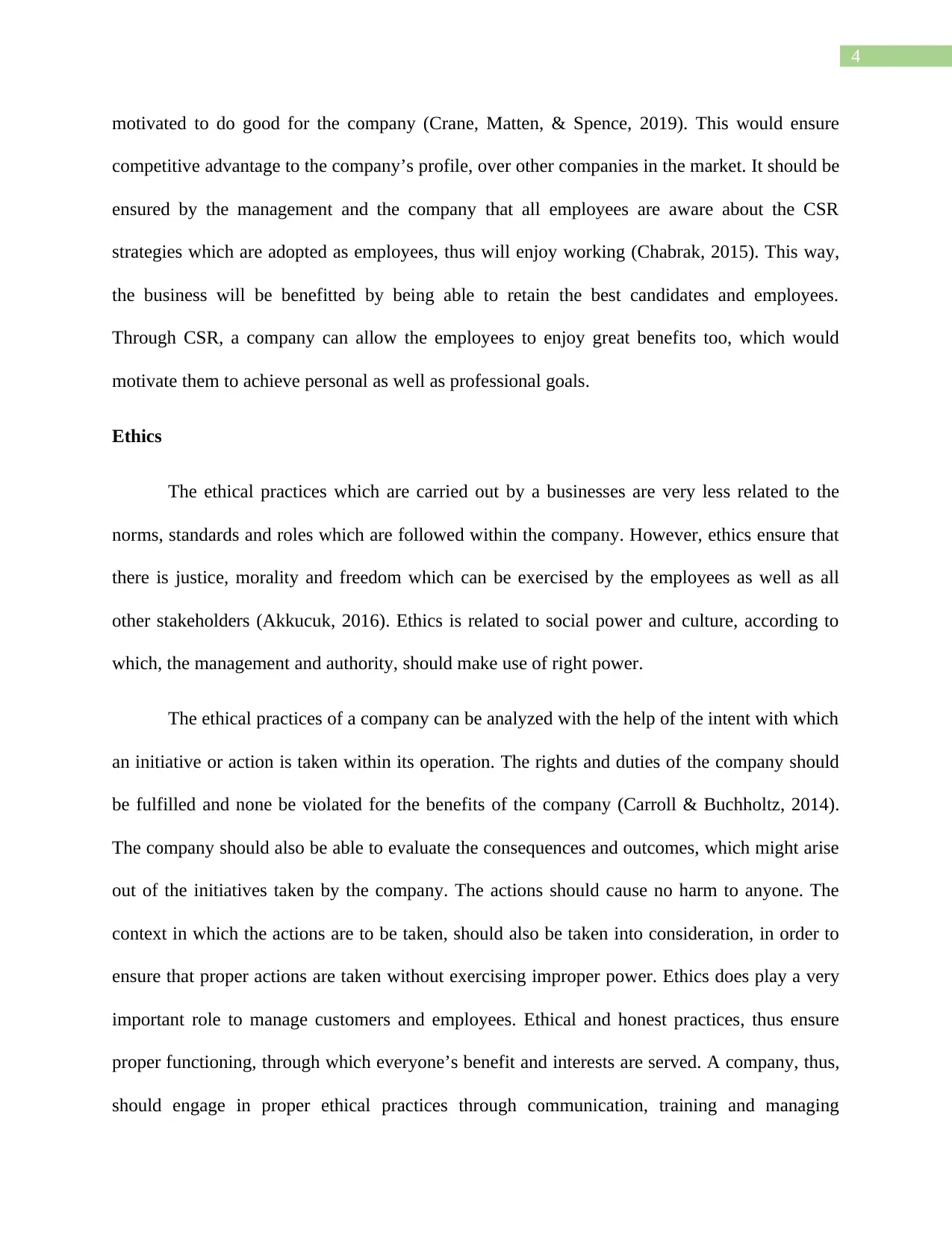
4
motivated to do good for the company (Crane, Matten, & Spence, 2019). This would ensure
competitive advantage to the company’s profile, over other companies in the market. It should be
ensured by the management and the company that all employees are aware about the CSR
strategies which are adopted as employees, thus will enjoy working (Chabrak, 2015). This way,
the business will be benefitted by being able to retain the best candidates and employees.
Through CSR, a company can allow the employees to enjoy great benefits too, which would
motivate them to achieve personal as well as professional goals.
Ethics
The ethical practices which are carried out by a businesses are very less related to the
norms, standards and roles which are followed within the company. However, ethics ensure that
there is justice, morality and freedom which can be exercised by the employees as well as all
other stakeholders (Akkucuk, 2016). Ethics is related to social power and culture, according to
which, the management and authority, should make use of right power.
The ethical practices of a company can be analyzed with the help of the intent with which
an initiative or action is taken within its operation. The rights and duties of the company should
be fulfilled and none be violated for the benefits of the company (Carroll & Buchholtz, 2014).
The company should also be able to evaluate the consequences and outcomes, which might arise
out of the initiatives taken by the company. The actions should cause no harm to anyone. The
context in which the actions are to be taken, should also be taken into consideration, in order to
ensure that proper actions are taken without exercising improper power. Ethics does play a very
important role to manage customers and employees. Ethical and honest practices, thus ensure
proper functioning, through which everyone’s benefit and interests are served. A company, thus,
should engage in proper ethical practices through communication, training and managing
motivated to do good for the company (Crane, Matten, & Spence, 2019). This would ensure
competitive advantage to the company’s profile, over other companies in the market. It should be
ensured by the management and the company that all employees are aware about the CSR
strategies which are adopted as employees, thus will enjoy working (Chabrak, 2015). This way,
the business will be benefitted by being able to retain the best candidates and employees.
Through CSR, a company can allow the employees to enjoy great benefits too, which would
motivate them to achieve personal as well as professional goals.
Ethics
The ethical practices which are carried out by a businesses are very less related to the
norms, standards and roles which are followed within the company. However, ethics ensure that
there is justice, morality and freedom which can be exercised by the employees as well as all
other stakeholders (Akkucuk, 2016). Ethics is related to social power and culture, according to
which, the management and authority, should make use of right power.
The ethical practices of a company can be analyzed with the help of the intent with which
an initiative or action is taken within its operation. The rights and duties of the company should
be fulfilled and none be violated for the benefits of the company (Carroll & Buchholtz, 2014).
The company should also be able to evaluate the consequences and outcomes, which might arise
out of the initiatives taken by the company. The actions should cause no harm to anyone. The
context in which the actions are to be taken, should also be taken into consideration, in order to
ensure that proper actions are taken without exercising improper power. Ethics does play a very
important role to manage customers and employees. Ethical and honest practices, thus ensure
proper functioning, through which everyone’s benefit and interests are served. A company, thus,
should engage in proper ethical practices through communication, training and managing
Paraphrase This Document
Need a fresh take? Get an instant paraphrase of this document with our AI Paraphraser
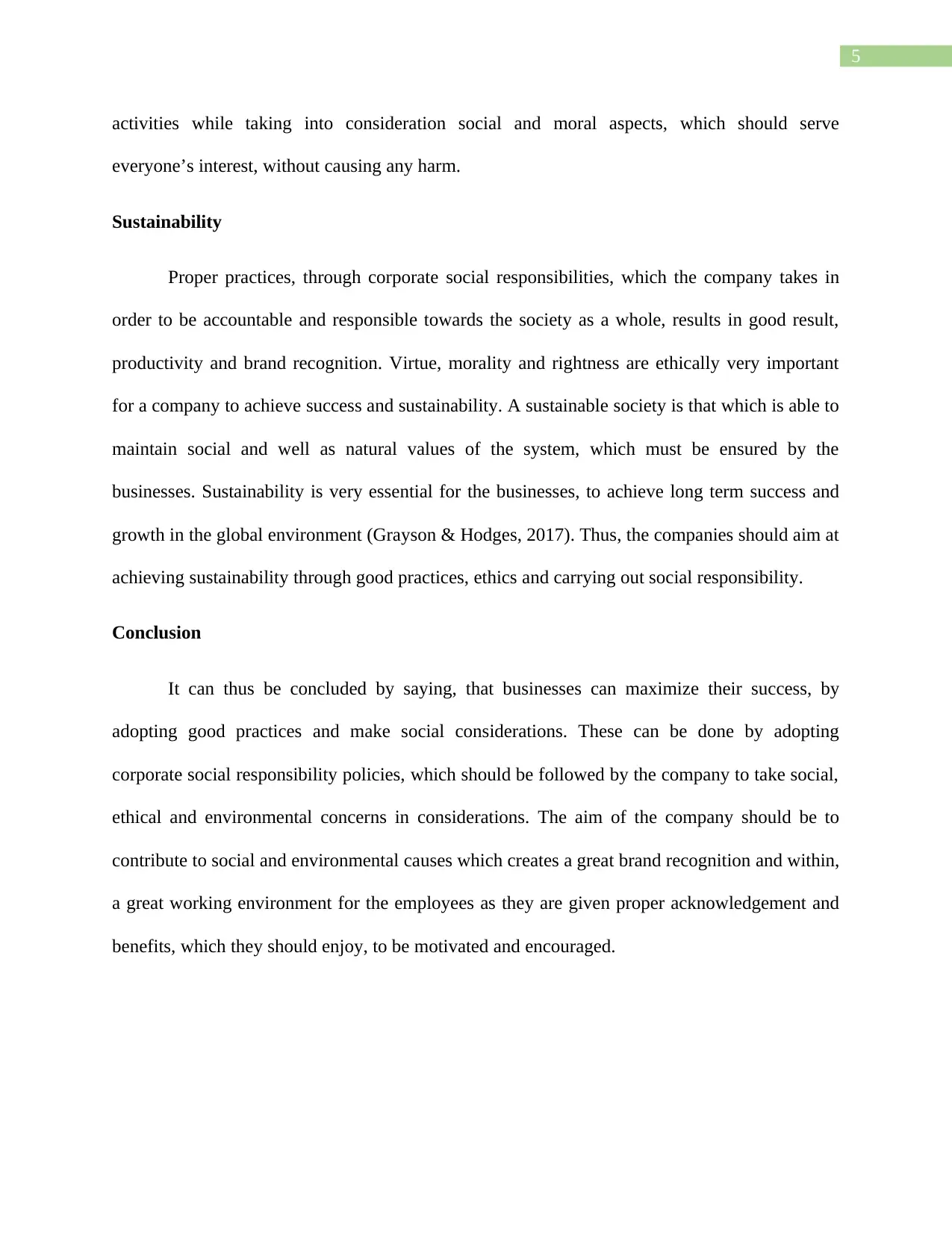
5
activities while taking into consideration social and moral aspects, which should serve
everyone’s interest, without causing any harm.
Sustainability
Proper practices, through corporate social responsibilities, which the company takes in
order to be accountable and responsible towards the society as a whole, results in good result,
productivity and brand recognition. Virtue, morality and rightness are ethically very important
for a company to achieve success and sustainability. A sustainable society is that which is able to
maintain social and well as natural values of the system, which must be ensured by the
businesses. Sustainability is very essential for the businesses, to achieve long term success and
growth in the global environment (Grayson & Hodges, 2017). Thus, the companies should aim at
achieving sustainability through good practices, ethics and carrying out social responsibility.
Conclusion
It can thus be concluded by saying, that businesses can maximize their success, by
adopting good practices and make social considerations. These can be done by adopting
corporate social responsibility policies, which should be followed by the company to take social,
ethical and environmental concerns in considerations. The aim of the company should be to
contribute to social and environmental causes which creates a great brand recognition and within,
a great working environment for the employees as they are given proper acknowledgement and
benefits, which they should enjoy, to be motivated and encouraged.
activities while taking into consideration social and moral aspects, which should serve
everyone’s interest, without causing any harm.
Sustainability
Proper practices, through corporate social responsibilities, which the company takes in
order to be accountable and responsible towards the society as a whole, results in good result,
productivity and brand recognition. Virtue, morality and rightness are ethically very important
for a company to achieve success and sustainability. A sustainable society is that which is able to
maintain social and well as natural values of the system, which must be ensured by the
businesses. Sustainability is very essential for the businesses, to achieve long term success and
growth in the global environment (Grayson & Hodges, 2017). Thus, the companies should aim at
achieving sustainability through good practices, ethics and carrying out social responsibility.
Conclusion
It can thus be concluded by saying, that businesses can maximize their success, by
adopting good practices and make social considerations. These can be done by adopting
corporate social responsibility policies, which should be followed by the company to take social,
ethical and environmental concerns in considerations. The aim of the company should be to
contribute to social and environmental causes which creates a great brand recognition and within,
a great working environment for the employees as they are given proper acknowledgement and
benefits, which they should enjoy, to be motivated and encouraged.
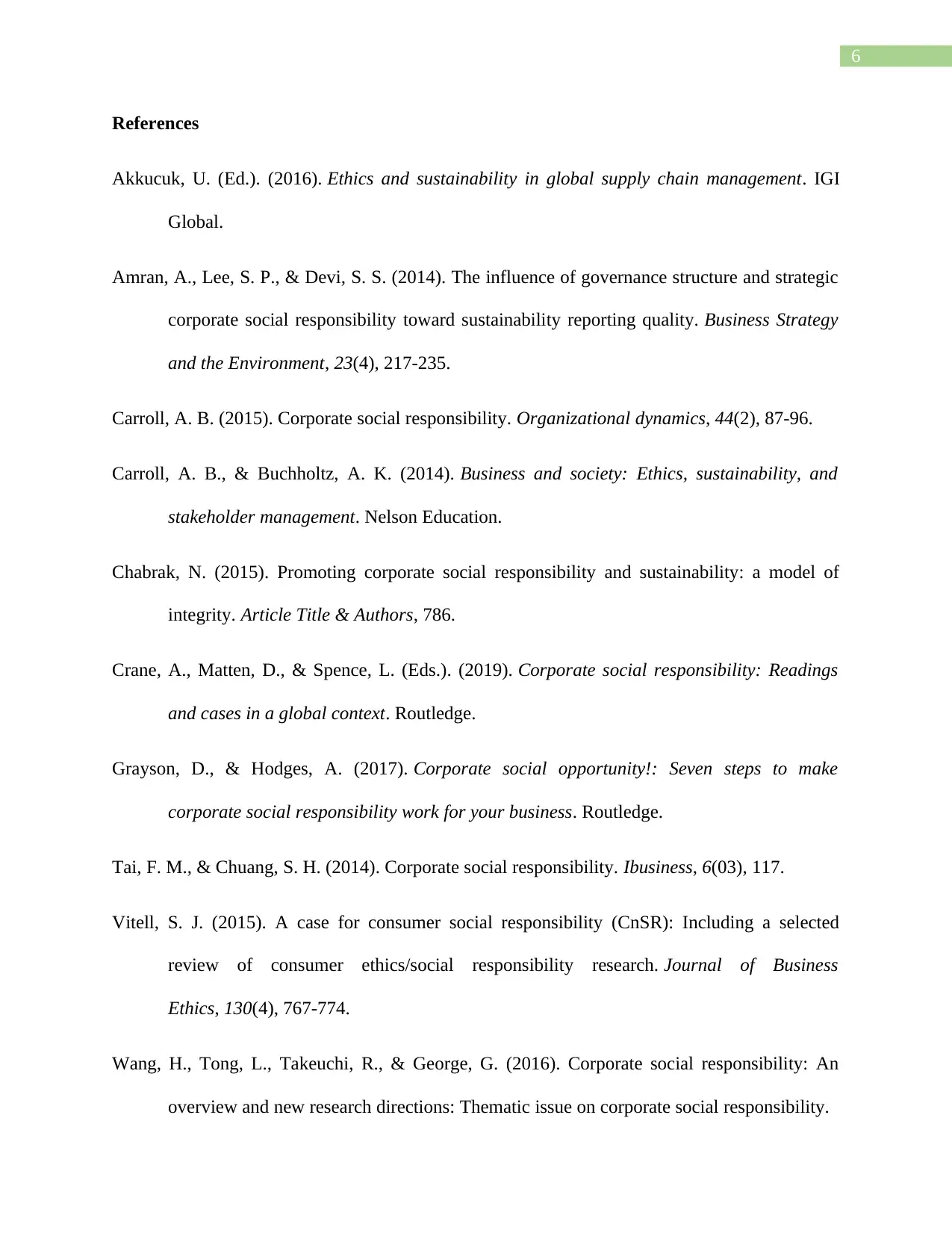
6
References
Akkucuk, U. (Ed.). (2016). Ethics and sustainability in global supply chain management. IGI
Global.
Amran, A., Lee, S. P., & Devi, S. S. (2014). The influence of governance structure and strategic
corporate social responsibility toward sustainability reporting quality. Business Strategy
and the Environment, 23(4), 217-235.
Carroll, A. B. (2015). Corporate social responsibility. Organizational dynamics, 44(2), 87-96.
Carroll, A. B., & Buchholtz, A. K. (2014). Business and society: Ethics, sustainability, and
stakeholder management. Nelson Education.
Chabrak, N. (2015). Promoting corporate social responsibility and sustainability: a model of
integrity. Article Title & Authors, 786.
Crane, A., Matten, D., & Spence, L. (Eds.). (2019). Corporate social responsibility: Readings
and cases in a global context. Routledge.
Grayson, D., & Hodges, A. (2017). Corporate social opportunity!: Seven steps to make
corporate social responsibility work for your business. Routledge.
Tai, F. M., & Chuang, S. H. (2014). Corporate social responsibility. Ibusiness, 6(03), 117.
Vitell, S. J. (2015). A case for consumer social responsibility (CnSR): Including a selected
review of consumer ethics/social responsibility research. Journal of Business
Ethics, 130(4), 767-774.
Wang, H., Tong, L., Takeuchi, R., & George, G. (2016). Corporate social responsibility: An
overview and new research directions: Thematic issue on corporate social responsibility.
References
Akkucuk, U. (Ed.). (2016). Ethics and sustainability in global supply chain management. IGI
Global.
Amran, A., Lee, S. P., & Devi, S. S. (2014). The influence of governance structure and strategic
corporate social responsibility toward sustainability reporting quality. Business Strategy
and the Environment, 23(4), 217-235.
Carroll, A. B. (2015). Corporate social responsibility. Organizational dynamics, 44(2), 87-96.
Carroll, A. B., & Buchholtz, A. K. (2014). Business and society: Ethics, sustainability, and
stakeholder management. Nelson Education.
Chabrak, N. (2015). Promoting corporate social responsibility and sustainability: a model of
integrity. Article Title & Authors, 786.
Crane, A., Matten, D., & Spence, L. (Eds.). (2019). Corporate social responsibility: Readings
and cases in a global context. Routledge.
Grayson, D., & Hodges, A. (2017). Corporate social opportunity!: Seven steps to make
corporate social responsibility work for your business. Routledge.
Tai, F. M., & Chuang, S. H. (2014). Corporate social responsibility. Ibusiness, 6(03), 117.
Vitell, S. J. (2015). A case for consumer social responsibility (CnSR): Including a selected
review of consumer ethics/social responsibility research. Journal of Business
Ethics, 130(4), 767-774.
Wang, H., Tong, L., Takeuchi, R., & George, G. (2016). Corporate social responsibility: An
overview and new research directions: Thematic issue on corporate social responsibility.
⊘ This is a preview!⊘
Do you want full access?
Subscribe today to unlock all pages.

Trusted by 1+ million students worldwide
1 out of 6
Related Documents
Your All-in-One AI-Powered Toolkit for Academic Success.
+13062052269
info@desklib.com
Available 24*7 on WhatsApp / Email
![[object Object]](/_next/static/media/star-bottom.7253800d.svg)
Unlock your academic potential
Copyright © 2020–2025 A2Z Services. All Rights Reserved. Developed and managed by ZUCOL.





